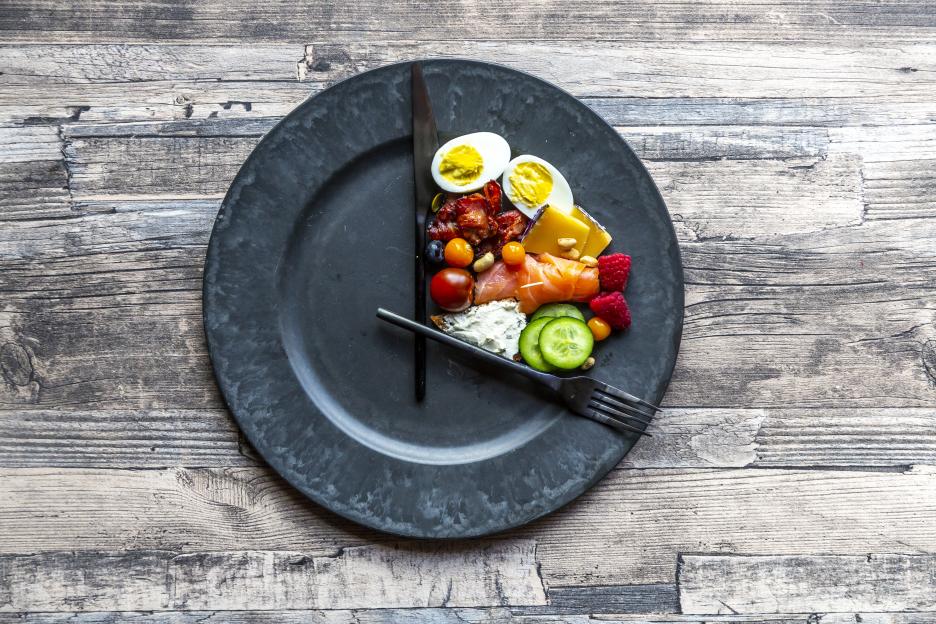BY the year 2040, 1.4million people are expected to be living with dementia.
It’s a huge jump from the current number of sufferers, which sits at around 982,000 according to the Alzheimer’s Society.
 Dementia experts have identified some specific, stand-out, brain-boosting foods
Dementia experts have identified some specific, stand-out, brain-boosting foods  Dementia can be genetic but lifestyle factors are also thought to be key drivers of the disease
Dementia can be genetic but lifestyle factors are also thought to be key drivers of the disease Although dementia can be genetic and age is a major factor, our lifestyles play a significant role in dictating our risk of developing the brain-robbing disease.
And that includes the foods we eat.
Research published in the journal BMC Medicine found that sticking to a Mediterranean diet , which focuses on whole grains, fruits, vegetables, seafood, beans, nuts and healthy fats, could help lower our chances of dementia by up to 23 per cent.
Experts also say there are some specific stand-out brain-boosting foods .
And despite what you may think, you don’t need to shell out a small fortune at an expensive health store to get them.
The 50p brain-booster
Next time you’re at the supermarket, don’t neglect the canned food aisle.
A tin of sardines will set you back just 50p in Tesco and is packed full of omega-3 fatty acids, specifically docosahexaenoic acid (DHA) and eicosapentaenoic acid (EPA).
“These are essential for brain function and cognitive health,”; Nichola Ludlam-Raine, registered dietitian and author of How Not To Eat Ultra Processed, tells Sun Health.
“DHA makes up about 25 per cent of the fat in the brain and is critical for memory, learning and reducing inflammation.
“EPA has anti-inflammatory effects too, which help protect brain cells and reduce the risk of neurodegenerative diseases such as dementia.”;
Too much inflammation in the body, which can be caused by exposure to environmental toxins, chronic stress , alcohol and even obesity , can heighten the risk of dementia, according to research published in the Journal of Neuroscience Nursing.
Tim Gaunt, nutritionist and biochemist, says that “sustained or chronic inflammation sends the immune system into overdrive”;.
“It is this sustained inflammatory response that contributes to the onset and development of serious disease,”; he adds.
 A tin of sardines costs just 50p in Tesco and could help lower your risk of dementia
A tin of sardines costs just 50p in Tesco and could help lower your risk of dementia Sardines also contain the co-enzyme Q10.
“This is essential for energy production and can also be found in organ meat – such as kidneys and livers – and many whole grains,”; Tim says.
Other oily fish to consider include salmon, trout, herring, mackerel and anchovies.
Vegan or veggie? Nuts, flaxseed, chia seeds and seaweed are all sources of omega-3 fatty acids . Or, consider an omega-3 supplement alongside your diet.
Nichola says: “Omega-3 supplements can be useful for those who do not eat oily fish, but they should not replace a well-balanced diet.”;
Other brain-boosting foods
1. Blueberries
Small but mighty, blueberries are packed full of antioxidants, specifically anthocyanins. These could help to protect your brain.
“Anthocyanins reduce oxidative stress and inflammation in the brain,”; Nichola says.
“Studies suggest they can improve memory, delay cognitive decline, and even improve brain cell communication.”;
Research published in the Journal of Agricultural and Food Chemistry found that supplementing your diet for 12 weeks with blueberry juice, equivalent to half a cup of blueberries, improved memory function in older adults with early memory decline.
Why not try adding blueberries to your cereal in the morning, blending them into a smoothie or just enjoying them as a snack?
You can buy a 350g bag of frozen blueberries from Asda for £1.98.
2. Spinach
Leafy greens are an easy addition to your day-to-day meals.
“They’re packed with folate, vitamin K and antioxidants,”; Nichola says.
“Folate supports neurotransmitter function and has been linked to a lower risk of cognitive decline.
“Vitamin K plays a role in brain cell protection and may help prevent Alzheimer’s disease.”;
Swap to wholemeal bread for more fibre, nuts for healthy fats, and sparkling water for less sugar
Nichola Ludlam-RaineDietitian
Even just one serving of leafy green vegetables a day could slow age-related cognitive decline, according to research published in the journal Neurology.
Spinach, kale and lettuce were all included in the study, with half a cup of cooked spinach or one cup of raw lettuce counting towards a daily serving.
These vegetables, which are available in Morrisons for under £2, contain vitamin E and selenium too.
“They protect brain cells against damage and inflammation, and work to prevent cognitive decline,”; says Tim.
 Blueberries are thought to have brain-supporting properties
Blueberries are thought to have brain-supporting properties 3. Walnuts
Walnuts are shaped like a brain for a reason, according to Nichola.
“These are the best nuts for brain health,”; she says.
“Walnuts contain alpha-linolenic acid (ALA), a plant-based omega-3, along with polyphenols that reduce inflammation and improve brain neuroplasticity.
“This is a process that involves the ability to make structural and functional changes to the brain.”;
A study published in the journal Nutrients in 2020 showed that eating between 12 and 18 walnut halves was linked to improved cognitive function, as well as a reduced risk of other diseases, including cardiovascular disease , depression and type 2 diabetes .
The research noted that these are all risk factors for the development of dementia.
A bag of walnut halves is available for £2 in Sainsbury's .
4. Eggs
Eggs for breakfast could be the secret to a healthier brain.
A study published in the Journal of Nutrition discovered that older adults who consumed more than one egg per week had a 47 per cent reduced risk of dementia compared to those who consumed less than one egg a week.
It’s thought to be because eggs, which cost as little as 18p each in Aldi, contain the nutrient choline .
“Choline is essential for memory and cognition,”; says Nichola.
“It’s needed for the production of acetylcholine, a neurotransmitter involved in learning and memory.
“Eggs also contain B vitamins, which support brain health too.”;
 Walnuts are the number one best nut for our brains, experts say
Walnuts are the number one best nut for our brains, experts say 5. Dark chocolate
If you’re in need of something to satisfy your sweet tooth, turn to dark chocolate which contains at least 70 per cent cocoa.
Nichola says that it contains flavonoids , which improve blood flow to the brain, boosting focus and memory.
Scientists have found that consuming six additional servings of flavonoid-rich foods per day is associated with a 28 per cent lower risk of dementia.
Although dark chocolate contains flavonoids, the flavonoid-rich foods involved in the study, published in JAMA, included tea, red wine and berries.
A bar of 70 per cent dark chocolate from M&S costs £1.25, and you can pick up a box of tea for just £2.
Other simple ways to slash your risk of dementia
By Isabel Shaw , Health Reporter
AS there's currently no cure for dementia, experts recommend focusing on ways to reduce your risk of developing the disease.
For some people, just going to work could do wonders for protecting their brain – as a new study found two specific jobs were linked to the lowest risk of death from Alzheimer's disease .
Researchers raised the possibility that jobs that require frequent spatial processing â such as figuring out a taxi route or the best way to navigate to a hospital â could lead to lower rates of death from Alzheimer's.
As part of their investigation, the team from Mass General Brigham used national data on the occupations of people who had died to evaluate risk of death from Alzheimer's disease across 443 professions.
Their results, published in The BMJ, found taxi driving and ambulance driving were associated with a lower rate of death from the disease compared to other jobs.
“The same part of the brain that's involved in creating cognitive spatial maps – which we use to navigate the world around us – is also involved in the development of Alzheimer's disease,” said lead author Vishal Patel, a resident physician in the Department of Surgery at Brigham and Women's Hospital.
“We hypothesised that occupations such as taxi driving and ambulance driving, which demand real-time spatial and navigational processing, might be associated with a reduced burden of Alzheimer's disease mortality compared with other occupations.”
But there are ways for everyone to lower their risk. These include:
- Not bingeing boxsets
- Doing crosswords (with your other hand)
- Being a social butterfly
- Eating a Mediterranean diet
- Losing weight
- Taking a multivitamin
- Having more sex
- Drinking more coffee
- Dancing
- Using Viagra
- Going for walks
- Looking after your teeth
- Getting your eyes and ears tested
- Sleeping well
You can read more about each tip here.
The foods to avoid
A diet rich in whole, nutrient-dense foods and low in ultra-processed foods (UPFs) can help protect the brain, improve memory and reduce your dementia risk.
But Nichola says that UPFs don’t need to be avoided altogether.
“It's just that too many of them in the diet means that not enough whole foods are being eaten to support your health,”; she says.
“Too many ultra-processed foods (in place of whole foods) can increase inflammation, oxidative stress and insulin resistance, all of which can harm brain health.
“I suggest people cut down on sugary drinks and refined carbohydrates such as white bread, sweets, biscuits and fizzy drinks.
“Swap to wholemeal bread for more fibre, nuts for healthy fats, and sparkling water for less sugar.”;
Nichola also recommends cutting back on processed red meats such as hot dogs, bacon and burgers.
She adds: “Trans fats found in some fast food can cause inflammation and raise cholesterol levels, although levels of trans fats in the UK diet are currently at an acceptable level for health for most people.”;







